Banking in Bahrain: In-Depth Overview of Banking, Banks and the Market
Abdul Karim Ahmed Bucheery, Chief Executive of BBK Bahrain
Despite the crisis, banks are still sticking to Bahrain and if you think about the reason for this, Bahrain is situated almost exactly in the middle between the richest oil field in the world and the richest gas field in the world.
Interview with Abdul Karim Ahmed Bucheery, Chief Executive of BBK Bahrain
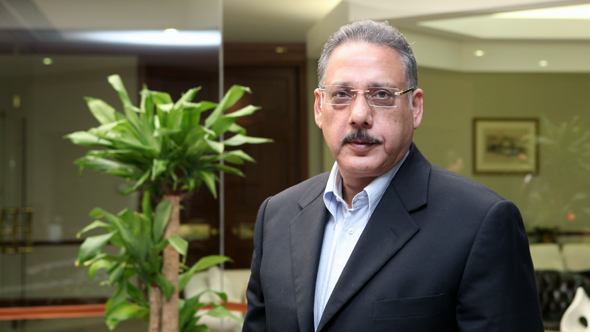
Two years after protestors blocked Bahrain’s financial district, do tensions still affect the banking sector? This has deterred some investors and made it harder for Bahrain to compete with other financial centers such as Dubai. However there has not been a mass exodus from Bahrain’s banking sector despite the decrease in assets last November. How can you describe this situation?
Despite the crisis, banks are still sticking to Bahrain and if you think about the reason for this, Bahrain is situated almost exactly in the middle between the richest oil field in the world and the richest gas field in the world.
You have correctly described the situation. Despite the crisis, banks are still sticking to Bahrain and if you think about the reason for this, Bahrain is situated almost exactly in the middle between the richest oil field in the world and the richest gas field in the world. Commuting to these two places is very easy from Bahrain so banks in Bahrain do not just cover the Bahrain market but their eyes are on countries like Saudi Arabia which is only a stone’s throw away from Bahrain, or on Qatar on the gas business, which is again a stone’s throw from Bahrain. We are linked by a causeway to Saudi Arabia and there is potential for building a bridge between us and Qatar in the next few years. So banks find it much easier to conduct business to cover the whole region out of Bahrain.
As well the regulation of the country is the second reason why banks are sticking to Bahrain. Third is the abundance of human resources – talented, skillful bankers. Fourth, and a very important reason, is the affordability of the cost of living. Bahrain is still much cheaper to do business in than many of its neighbors.
To establish a presence in a place and establish the network you have is difficult to replicate in a short amount of time. So banks or any business don’t tend to change their domicile because of certain temporary upheavals here and there unless that problem lasts for a long time – then banks will of course change. Look at the example of Beirut in the 1970s. Not all of the banks left Beirut when the civil war erupted in the early 1970s. It took years for banks to leave Beirut after they realized for sure that Beirut was not coming back to the way it was within a short span of time. It is the same thing anywhere else. You may have a crisis but if they are of a short nature, banks or any other business will not just take drastic measures because of a temporary problem.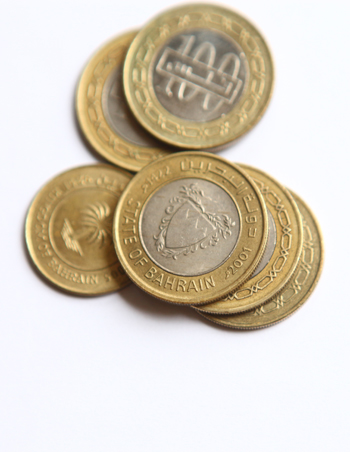
In response to the country’s improved economic fundamentals in January, S&P’s rating has moved from negative to stable which is a testament to how the fundamentals are improving. Where do you see the future of Bahrain’s credit rating and now that borrowing has become cheaper, how is it going to affect the sector?
To start with, as I’ve said in the past, I do not subscribe to the action that was taken by the rating agency to downgrade the country’s rating overnight from A- to BBB, sort of two notches downgrade. I think they made a hasty decision without taking the time to properly assess the implications of what has happened on the country’s ability to maintain the momentum of the economy. Thanks to God they have realized that the country has continued to do well. We grew last year at a rate of 3.9% in and the expectation for 2013 is that we’ll grow by 5%. Now a growth rate of 5% is really impressive in the current situation. I think that the 5% is attainable as judged by the first two months of the year because last year the output of the country was impacted to a large extent by a technical problem that happened in the largest oil field – Abu Safa oil field – which has reduced the output of our oil production. Now that the problem is fixed, the output will go back to its normal rate and I think that will contribute to achieving the target of 5%. So basically I think in terms of rating, we will only be going from here to better ratings. I think the next step probably will be a positive outlook and then hopefully we will go back into our old rating of a minimum of A-. I’m hopeful that this will happen. How long will this take? It usually takes a long time but I hope that within the coming year we can achieve that.
In terms of cost of borrowing, you are right. The fundamentals of the economics of Bahrain are much better than the actual rating. Judged from the tightening of the credit spreads, look at the credit spreads of the paper that had been issued by the country. They have tightened a lot and it’s becoming really scarce. Also, people are holding onto it because it gives them a good return and they are quite comfortable with the credit risk of the country basically.
“At the end of September 2012, the BBK’s balance sheet grew remarkably to 7.1 Billion BD, an increase of 9.1% when compared to September 30, 2011.” The results are even more positive for the end of 2012. Can you give us more details about the key financial ratios for 2012?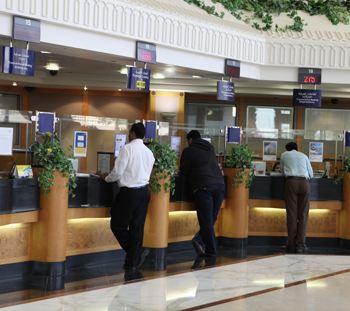
To start with, the year-end numbers for 2012 were even better than the September 2012 number that you just quoted. The balance sheet size has crossed the 8 billion US$ mark and year-on-year we have grown by roughly 12%. The reason is that we did not stick to the local market because the local market, whether we have problems or not, is small and there are too many banks in the country; therefore we looked beyond the borders of Bahrain. We have been very active in the neighboring markets such as Saudi Arabia, Qatar and Oman where we have no local presence. Of course we have local presence in Kuwait and the UAE but adding to the businesses we generated from these places, we have also been very active in other markets such as Saudi Arabia which is a large market. It also provides opportunities to book loans and investment and grow our balance sheet.
Besides that we have also been looking at the international market on a very limited scale. We have also been actively participating in the capital market issues of certain names that we like. The growth in our balance sheet was basically fueled by the growth in our investment portfolio more than the loan portfolio. Our investment portfolio has grown by double digits while our loan portfolio has grown by something like 7 to 9% if I remember correctly.
Do you find sufficient lending opportunities in the Kingdom?
Given the strong liquidity that we have and the excess capacity for lending I think the lending opportunities in the country do not meet our aspirations. We need to look outside Bahrain. There are not too many lending opportunities in the country unfortunately but I expect that the situation will change in the near future. Now that the government has finalized its largest budget in its history for the years 2013 and 2014, I hope that the spending end of this budget will start and financing the infrastructure project will commence. Hopefully there will be enough business for everybody to deploy their excess liquidity.
Because lending has resumed and there is plenty of liquidity in the market, could the excessive credit growth lead to new bubbles such as we saw in real estate?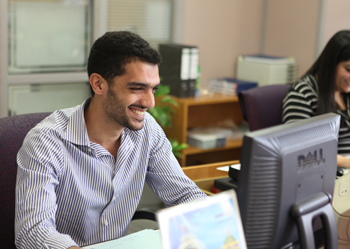
I think we have learned lots of lessons from past experiences. Most of the banks are becoming very conservative in their lending and are going back to the ABCs of doing banking. I think we will be more careful in assessing credit. I do not anticipate there will be any bubbles in the future like what we have seen in real estate. But again, if you look at real estate, there has been a downturn in the real estate market like any other country but banks have not lost huge money in lending to real estate-related financing. Of course there are certain defaults like any other sector of the economy but they are not beyond any normal accepted levels.
You mentioned that your trading division is doing tremendously well. What are the risks of the deterioration of these non-traded investments and ultimately how safe are these investments?
Like any other bank, we look very carefully at the credit and ratings of these papers, although the ratings especially in the past few years did not mean a lot. You had those structured investment vehicles (SIV’s) that were rated AAA and they defaulted overnight. But we do our thorough internal assessment of any investment that we make. I do not foresee that there will be a problem in the portfolio. The credit spreads are tightening but that on the other hand means that the mark to market value of your investment is growing. This is what has happened in the year 2012 where the market value of our investment has grown positively and has thus enhanced the capital base of the bank as well as the condensed financial income statement that has shown I think a 71 million BD profit from the mark to market valuation of the investment portfolio.
The banking sector has seen some consolidation in recent months. There was a merger between Ithmaar Bank and First Leasing Bank and also a 3-way merger between Elaf Bank, Capital Management House and CAPIVEST. What is the outlook for the sector for retail, investment and Islamic banking?
I think consolidation will continue to be a very serious method that many players in the market will look at and when opportunities come and the need arises, there will be consolidations. The newest that we have heard in the market is that National Bank of Bahrain is now taking over a significant share in Bahrain Islamic Bank so basically there is some sort of consolidation between one of the oldest Islamic banks in Bahrain and a major commercial bank, again one of the oldest in Bahrain, which I think is a good move to bring stronger banks into the market.
What I’d like to see is a merger between strong, large banks. What has happened so far is a merger between small banks. What any observer would like to see is a merger of powerful houses, if you like. I have my doubts that anything like that will happen in the near future. I don’t think that the need has yet arisen but I think it will in the near future. How far from now I cannot predict.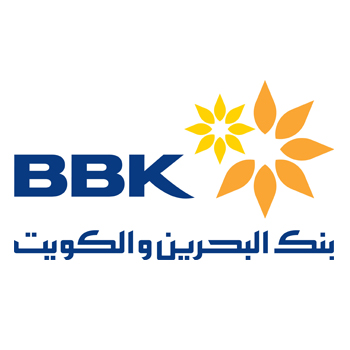
How is BBK going to play this game?
BBK, like any other bank, is open to ideas and suggestions. We are not looking at this time at any major acquisition, merger or consolidation. We have nothing on the table at this stage. But outside Bahrain, we are creating companies. We are acquiring new businesses. These are small businesses, not directly for BBK but for our wholly-owned subsidiaries like our call center and our credit card company. So we are always looking to expanding and creating businesses, replicating the success we have had in Bahrain and in other countries where there is need for that sort of business. We will be open-minded regarding any proposal that comes to us for any consolidation, merger, acquisition or so.
What is the new strategy for 2013-2015?
To start with, I am glad that our chairman was pleased at the results. We work to please all our stakeholders and not only our shareholders. Shareholders are one of the most important stakeholders and we are pleased they have expressed pleasure and satisfaction with the performance that we have achieved in 2012.
This year we started our new three-year strategy which spans over the years 2013 to 2015. The new strategy is not radical but we are trying to build on the achievements that we have made so far. We have learned good lessons from our previous strategy. For instance we have withdrawn or changed our international business more towards GCC and this has reaped benefits for us because we entered the market at the right time. We will be cementing this going forward.
We will be looking into any expansion opportunity outside Bahrain into countries that we feel comfortable with. We will continue to try to expand our operation in India because we think being one amongst a couple of Middle Eastern banks who have a presence in India, we have a role to play in participating and facilitating the trade and flow between India, which is a major exporter country, and the GCC market and the wider middle east market which also has strong importing countries. We will focus on our retail banking business, enhancing our delivery channels in Bahrain and focusing more on the IT and electronic delivery channels. So this is basically one of the most important aspects of our current strategy.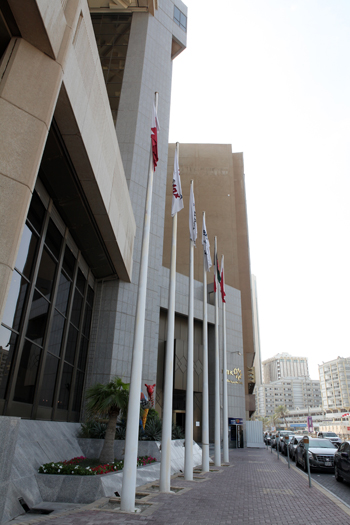
Are there any numerical goals you have set out for growth?
Of course but unfortunately being a listed company I cannot disclose these numbers.
You have hired Booz & Company to undertake a cost optimization review of BBK. What was the outcome of the review?
Yes we engaged Booz & Company to do a cost-optimization or cost-rationalization exercise for us. They gave their recommendation to the board and the board has accepted most of the recommendations given by Booz & Company, but not all. The purpose of the exercise was to close the gaps in our operation so that we improve efficiency and keep our processes simple and enhance our delivery times to save on any unnecessary costs. There is always a room to do that but you need to be focused on the cost, of course while trying to improve your ability to generate revenue. We were hoping that after implementing those initiatives that were recommended to us by Booz & Company that we would be able to reduce our costs. Again, I don’t think I can disclose numbers but there are quite good savings. It’s not a significant but quite good. Hopefully this will improve our cost to income ratio going forward.
What do you see as the biggest risks for the banks in the upcoming years?
Of course the biggest risk for banks is to not have liquidity to support their lending activities. As you know, this is the bread and butter for any bank. So far liquidity has been very good in Bahrain. BBK is enjoying strong liquidity which is one of the most important risks for any bank. Many banks in the past have failed because they did not have enough liquidity to meet their debt obligations and demands of their clients.
Another important thing that banks will go through is the introduction of Basel III and the minimum capital requirements. There will be much tougher requirements with Basel III and you will need to allocate a good part of your capital for various risks.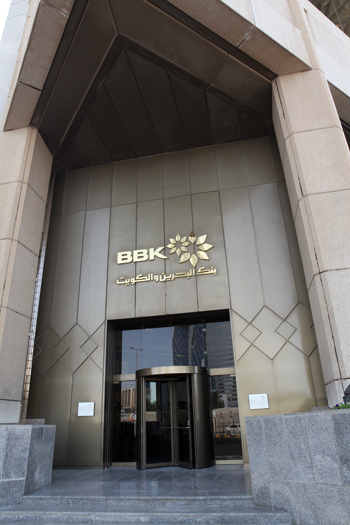
The other thing that I think will be very exciting and challenging is what has been recently announced by the Central Bank Governor at the Euromoney Conference that took place two days ago. He announced that the CBB will basically identify a number of local banks which will be categorized as Domestic Systematically Important Banks (DISB) for the banking system. I think he was alluding to a few number of banks and if that’s the case, then BBK being one of the largest banks in Bahrain and one of the banks with one of the highest market share, will definitely be amongst that list. While this is positive because it will give confidence to the market, the customer and the depositor, it will also mean that you will be under greater scrutiny by the Central Bank. You will have to adhere to much more stringent requirements by the Central Bank to make sure that you will comfortably survive shocks going forward so that the Central Bank will be comfortable specifying you as a DISB.
What are the latest developments in terms of Basel III? How has FATCA impacted the local retail banks in Bahrain?
The final legislation for FATCA has come out and will be implemented beginning next year. There are many policies and system enhancements that we need to do in terms of IT and processes to ensure full compliance with FATCA requirements. The Central Bank has directed all players in the Bahrain market to be prepared and will be supportive of efforts to prepare for full compliance with FATCA, although the Central Bank of Bahrain has not yet decided which mode or route they will go through.
Just one thing that keeps bothering bankers is that banking is not going to be as easy as it used to be in the past. The high return that the banks used to generate in the past, higher than 20% return on equity, will no longer be the case going forward with the more difficult and stringent requirements on capital allocation, risk and what have you, including the sort of caps you receive from the regulators and the interest rate you can charge.
Under FATCA there are two options. One is intra-governmental agreement so that the communication is government to government. The government of Bahrain will basically ask the players in the market to go through them in talking to the tax authorities in the US. Another option is the bank directly talking to the tax authorities, which is the IRS in the US. They have not decided which option to take but in either case we will have to be prepared for that. We are in that stage now. We are trying to assemble our team within the bank to determine whatever changes we need to make internally to be able to become compliant with the FATCA deadline at the end of 2013.
Regarding Basel III, we are still waiting for the final ruling from the Central Bank of Bahrain. There have been soft talks about the situation but we have not yet received the final requirements from the Central Bank. We know that we’ll have to be ready to allocate part of our capital to basically mitigate certain risks, be it market, operational, environmental, and others which are all under the Basel III requirements. I believe we are prepared and the capital of BBK should be quite sufficient to meet all the requirements of Basel III, else we will think of ways to enhance the capital to become compliant.
Can you comment on the Corporate Credit Returns Bureau?
The latest I heard is that they are about to reach a final setup to launch the Bureau but it hasn’t been launched yet. I am not sure when it will be launched but we are all eager to see this happen as quickly as possible.
Is there anything you would like to add?
Just one thing that keeps bothering bankers and the banking industry in Bahrain is that banking is not going to be as easy as it used to be in the past. The high return that the banks used to generate in the past, higher than 20% return on equity, will no longer be the case going forward with the more difficult and stringent requirements on capital allocation, risk and what have you, including the sort of caps you receive from the regulators and the interest rate you can charge. I think banking will become more difficult and challenging going forward and the high returns we were used to will no longer be the case. We will be happy to see anything north nof 10%. As banks become more and more regulated, there will always be more pressure on the bank’s ability to generate profitability for shareholders.